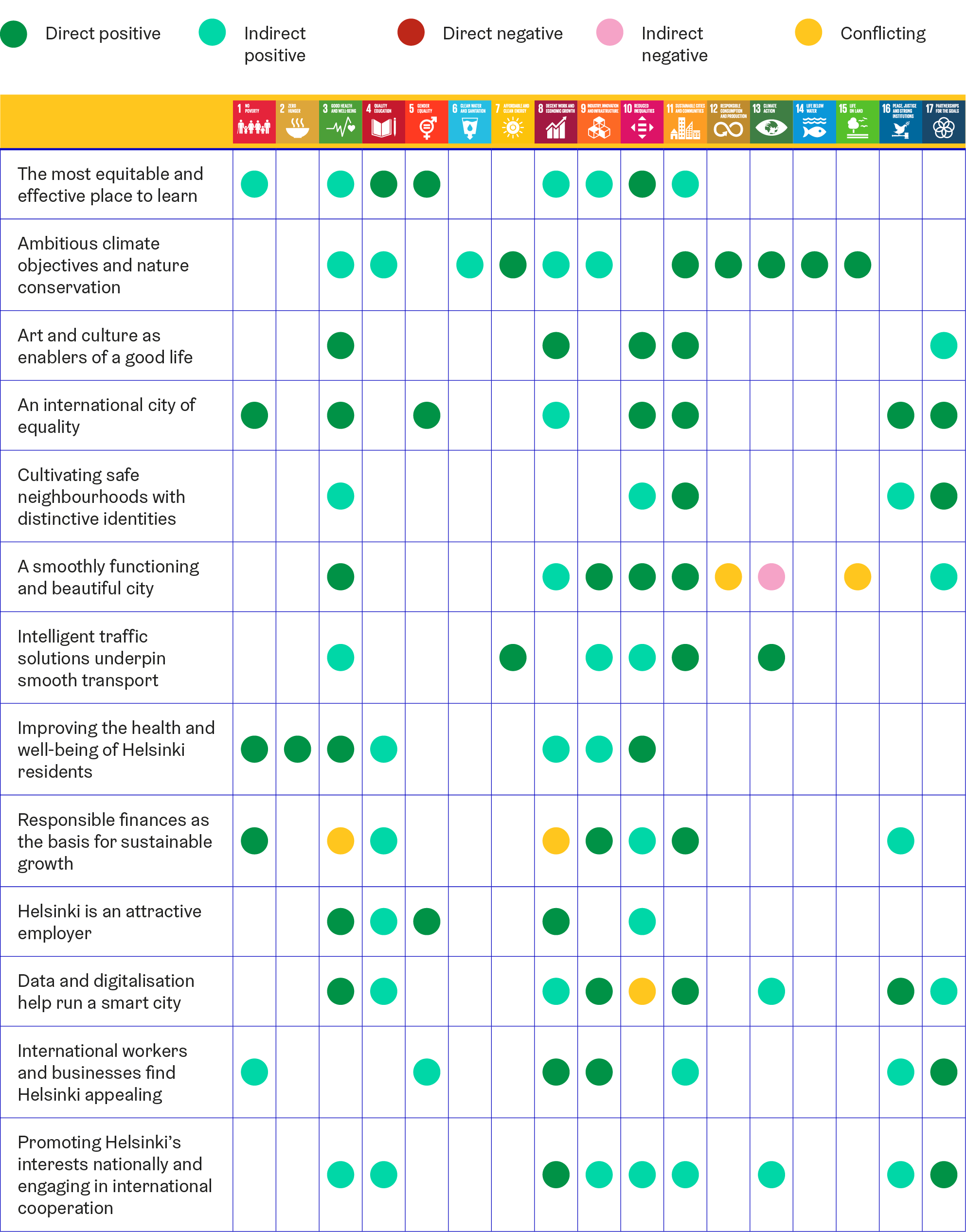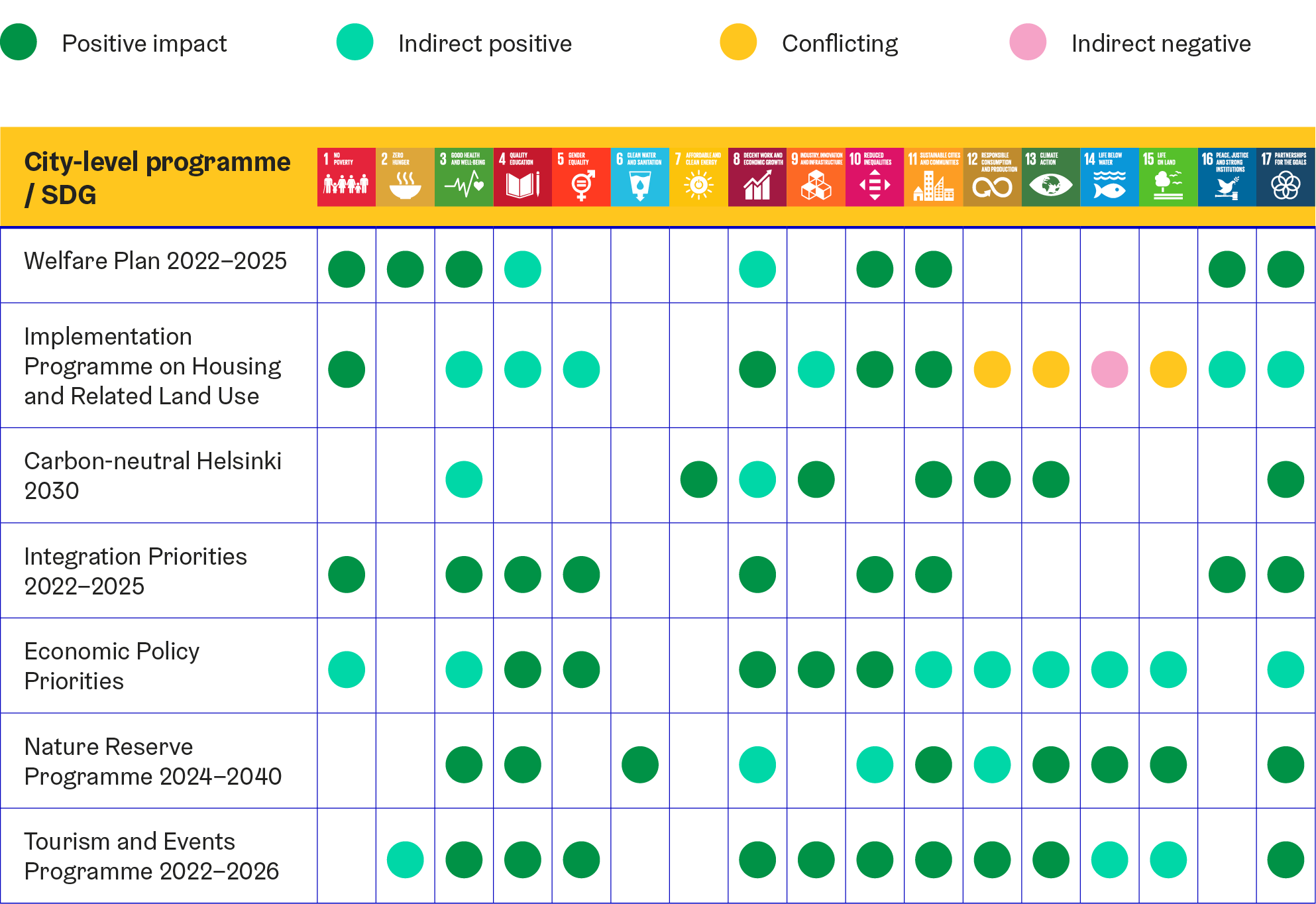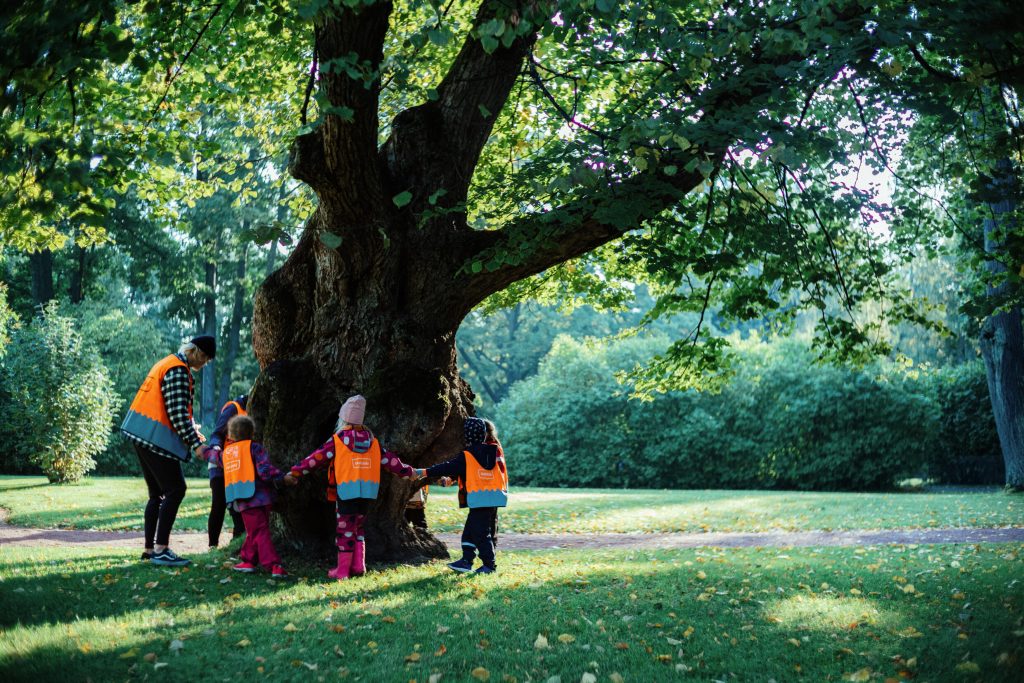Assessment of sustainability work over the strategy period
The Helsinki City Strategy for 2021–2025, entitled A Place of Growth, includes ambitious sustainability objectives. Even in the preface, it is pointed out that sustainable growth in Helsinki should be in balance with the prevailing ecological limitations, creating benefits that are socially, financially and culturally sustainable. The key sustainability objectives of the strategy period have been the prevention of segregation, ambitious climate responsibility and nature conservation, the development of the city’s comfort and vitality, and the improvement of productivity and the availability of labour. To support the progress and success of these key strategic objectives, the City has set up strategic programme groups led by the mayor, which have intensified cross-sectoral cooperation to promote the objectives, among other things.
The table below shows the links between the strategy’s 13 priorities and the UN’s SDGs. Like the SDGs, the strategy’s goals also have impacts that conflict with each other and in relation to the sustainability goals. For example, strong urban growth and construction will increase greenhouse gas emissions and other environmental impacts in the area.
Strategy priorities and SDG tabulation

Identification of conflicts and boundary conditions
In 2023, Helsinki wanted to incorporate the core ideas of ecological boundary conditions and a social foundation to its interpretation of the SDGs. Growth and wellbeing should be built in a way that does not jeopardise ecological sustainability or leave poorer countries behind. At the time, it was stated that this is also a sustainability transition, a change in the mindset and operating culture of the City organisation, which requires long-term action, goals and decision-making. There has been no significant change in these two years, but there are signs of progress in the sustainability transition, for example in the cross-cutting work being done to promote the SDGs and the increased use of sustainability language. Efforts have been made to open up and describe the global SDGs from the perspective of Helsinki’s operations.
During this strategy period, Helsinki has focused more on the conflicts between the SDGs, better identifying them and incorporating them into the strategic themes, such as the reconciliation of the city’s growth with nature values.
Helsinki also participated in the national challenge cluster work on the theme of urban planning that takes sustainability targets into account together with a group of other cities. The challenge cluster work showed that there is still a long way to go to adequately integrate sustainability targets into urban planning. We are not yet harnessing the full ‘sustainability potential’ of our planning system, as it is very growth-oriented and focuses heavily on new construction rather than existing structure and facilities. On the other hand, it should be clear that the equation of sustainable urban planning cannot be solved by simply adjusting the system. Change starts with the system’s users, who highlight problems and seek solutions. The challenge cluster work has shown that there are ambitious and visionary planners in cities, who are ready for the reforms required by the planetary limits of urban development.
Evolution of sustainability management over the strategic period
The 2021–2025 strategy period has been the first strategy period during which sustainability management has been systematically developed in the City Executive Office’s Strategy Department. In addition to sustainability assessments and cooperation and support within the City and Group, this work has included the development of various processes, training and skills. During the strategy period, the City has launched an online training course on sustainable development for its staff and organised around 25 different training courses and workshops. In addition to these, the City has developed its set of ethical guidelines, improved the social responsibility of procurement and prepared the Helsinki Group for EU sustainability reporting, among other things.
In addition to the City Strategy, the Sustainable Development Goals are also reflected in other key programmes of the City, through which many of the goals are being promoted. Over the past three years, the City of Helsinki has also examined its strategic programmes and financial and operational planning from the perspective of sustainable development with an SDG analysis tool. The analysis helps open up the links between the objectives of the City’s programmes and the sustainability goals of the City Strategy, and identify the UN SDGs that the programme plays a key role in implementing. An SDG analysis has been carried out for ten key programmes, including the City of Helsinki Welfare Plan 2022–2025, Economic Policy Priorities, the Tourism and Events Programme 2022–2026 and the Carbon-neutral Helsinki 2030 emissions reduction action plan.
The analysis tool has been found to be a useful way of assessing the programmes’ wider impacts more comprehensively. The analysis tool assesses the potential direct or indirect positive or negative impacts of the programme on each of the SDGs. This analysis illustrates and articulates the conflicting impacts of the programmes on city residents, biodiversity or Helsinki’s climate objectives. It is essential to bring these conflicts to light so that their impacts can be minimised and managed.
SDG analyses for key programmes in the 2021-2025 strategy period

SDGs as part of financial and operational planning
During the 2021–2025 strategy period, the link between financial and operational planning and sustainable development has been developed. In 2022–2023, Helsinki participated in the national development work on sustainable development budgeting with six other municipalities. In addition to the climate budgeting already in place, Helsinki looked at sustainable development budgeting as a whole, in particular the setting of budgetary targets and the aspects of effectiveness and sustainability. The development work included a background study on the relationship of the divisions’ budgetary targets with the SDGs and the key sustainability goals of the City Strategy in 2022 and 2023, and linked the budgetary targets to the SDGs in the table of objectives. A five-part training course on effectiveness was organised for the divisions’ experts who set budgetary targets, which improved the quality and effectiveness of the targets and indicators. The focus of City-wide objectives was broadened to include not only social and economic but also environmental sustainability. The development of effectiveness and sustainability analysis has been found to take several years. Further development work is still needed to set City-wide objectives, communicate on objective and strategy indicators, and assess impacts from a sustainable development perspective.
The graphs below show the links between the 2024 and 2025 budgetary targets and the SDGs. They show that the divisions’ budgetary targets have a strong focus on social and economic sustainability.
SDGs promoted by the 2024 and 2025 budgetary targets

Finland’s six largest cities as pioneers of sustainable development
Finland is a forerunner in the work on sustainable development and has also been recognised for it. During this strategy period, Helsinki has actively participated in cooperation promoting sustainable development at the national and international level. Helsinki has been active in promoting the Strategic Management of SDGs in Cities network project of Finland’s six largest cities, which was launched in 2021 and extended in 2023. The network has developed practical tools for cities, promoted national and international cooperation and shared best practices.
Helsinki also participates in many different international networks or projects promoting sustainable development, including Eurocities SDG Taskforce, UNICEF’s Child Friendly Cities Initiative, the projects of Bloomberg Philanthropies and various ICLEI working groups. Helsinki also actively participates in the WHO Healthy Cities Network.
Helsinki has also highlighted the SDG work in the networks it coordinates and its business and partnership cooperation. A large number of Society’s Commitments to Sustainable Development have been made in Helsinki. Most of the commitments are made by individuals, companies and various organisations and associations.
Over the past four years, Helsinki has actively cooperated with UN operators and the cities of New York and Tokyo, for example, and has participated several times in the UN’s summits on sustainable development as part of the Finnish delegation. Helsinki’s SDG work has contributed to the emergence and deepening of many strategic international partnerships. By setting an example in the promotion and reporting of the SDGs at the local level, Helsinki can promote sustainable development globally and influence the promotion of the SDGs beyond its own borders in cities around the world.
Sustainability work in divisions and group companies
In addition to the strategic sustainability work led by the central administration, Helsinki’s divisions and group companies have promoted the Sustainable Development Goals in their own operations. The SDGs need to be worded and adapted to fit the specific tasks of the City organisation. During the 2021–2025 strategy period, two of the City’s divisions, the Urban Environment Division and the Social Services, Health Care and Rescue Services Division, have drawn up their own sustainability guidelines. Among Helsinki’s municipal enterprises, Palvelukeskus Helsinki has its own sustainability programme. Other divisions and enterprises carry out active environmental work. The City’s group companies will have to adapt their data collection as the European Union’s Corporate Sustainability Reporting Directive expands to cover a wider range of organisations.
The Social Services, Health Care and Rescue Services Division’s sustainable development programme for 2024–2026 looks at the division’s activities through the Agenda 2030 framework and its 17 SDGs. The programme excludes goals related to the division’s core activities, such as SDG 3 Good health and well-being and SDG 1 No poverty, as their perspectives and targets are constantly being evaluated in the division’s activities. The sustainable development programme focused on goals 13 Climate action, 11 Sustainable cities and communities, 10 Reduced inequalities and 12 Responsible consumption and production, on which the division’s service departments have a major impact. The sustainable development programme brings together the most relevant policy documents that guide the Social Services, Health Care and Rescue Services Division’s efforts to contribute to these four SDGs. In addition to this, the programme outlines the operational goals for SDGs 10, 11, 12 and 13, the measures to be taken to achieve them and the indicators to monitor success. The goals to be monitored include the ability to reach older people with an immigrant background, the reuse of furniture and the reduction of emissions from the division’s car fleet, among others.
The Urban Environment Division has started work to develop sustainability work in the division during this strategy period. The aim is to integrate the 17 SDGs into the division’s environmental management perspective, so that the division can be managed more sustainably as a whole. The end result is a better integration of sustainability management with financial and operational planning.
The European Union’s Corporate Sustainability Reporting Directive (CSRD) has been phased in over the strategy period. Eight of Helsinki’s group companies will be subject to reporting obligations from 2025 onwards: Helen Ltd, Port of Helsinki, Metropolitan Area Transport Ltd, Helsingin kaupungin asunnot Oy, Helsingin Asumisoikeus Oy, Auroranlinna, Seure and DigiHelsinki. Helsinki has supported reporting readiness by providing training on the CSRD during 2023 and 2024. To achieve reporting readiness, group companies must, among other things, carry out a double materiality analysis and identify the reporting standards and data points that apply to them.
Other Helsinki subsidiaries have also made progress in their sustainability work: for example, Helsinki City Premises Ltd has also conducted a materiality analysis of its operations for its sustainability programme to be finalised in 2025, even though the company is not covered by the CSRD’s reporting obligation. The company wants to contribute to a vibrant and sustainable urban culture and create an operating environment for its lessees that supports responsible business and encourages new operating models. Helsinki Events Foundation calculated the carbon footprint of its events in 2023 and aims to minimise the environmental footprint of its events in terms of energy, waste, procurement and accommodation. The foundation also requires its staff, performers, event partners and subcontractors as well as event visitors to commit to the principles of equality, fairness and non-discrimination. Other subsidiaries also have their own sustainability and environmental programmes.

